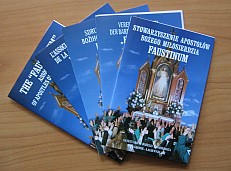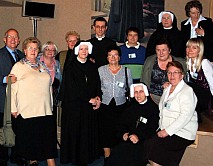
 On 6 March 1996, at the Shrine of The Divine Mercy in Kraków-Łagiewniki, and in response to the request of Mother Paulina Słomka, Superior General of the Congregation of the Sisters of Our Lady of Mercy, Cardinal Franciszek Macharski, Archbishop of Kraków, established the “Faustinum” Association of Apostles of The Divine Mercy. The Association comes under both Church and Civil Law, that is it has both Church and Civil legal status. It operates in the diocese of Kraków and, with the consent of Bishops Ordinaries, also in other dioceses in Poland and abroad. The Association is for priests, consecrated persons and lay faithful from around the world who, under the leadership of the Congregation to which St. Sister Faustina the Apostle of The Divine Mercy belonged, and under the spiritual guidance of the priests of the Society of Jesus, wish to join in the work of proclaiming the message of Mercy to the world through their life witness in word, deed and prayer. The “Faustinum” Association has as its main task the running of a formation programme for these Apostles of The Divine Mercy, a course which is conducted in several languages.
On 6 March 1996, at the Shrine of The Divine Mercy in Kraków-Łagiewniki, and in response to the request of Mother Paulina Słomka, Superior General of the Congregation of the Sisters of Our Lady of Mercy, Cardinal Franciszek Macharski, Archbishop of Kraków, established the “Faustinum” Association of Apostles of The Divine Mercy. The Association comes under both Church and Civil Law, that is it has both Church and Civil legal status. It operates in the diocese of Kraków and, with the consent of Bishops Ordinaries, also in other dioceses in Poland and abroad. The Association is for priests, consecrated persons and lay faithful from around the world who, under the leadership of the Congregation to which St. Sister Faustina the Apostle of The Divine Mercy belonged, and under the spiritual guidance of the priests of the Society of Jesus, wish to join in the work of proclaiming the message of Mercy to the world through their life witness in word, deed and prayer. The “Faustinum” Association has as its main task the running of a formation programme for these Apostles of The Divine Mercy, a course which is conducted in several languages.
 Over a considerable period of time, people have been contacting the Congregation of the Sisters of Our Lady of Mercy to ask whether there could be a tertiary order, the Apostolate of Sister Faustina, and a book where the names of worshipers of The Divine Mercy could be recorded. They had a desire to link in some way with the Shrine of The Divine Mercy in Kraków-Łagiewniki and with the Congregation to which St. Sister Faustina belonged. Before taking action the Congregation of the Sisters of Our Lady of Mercy spent many years discerning the Will of God in this matter so as to be certain of what God wanted. Discernment, alongside research into the heritage of St. Sister Faustina, was accompanied by intense prayer.
Over a considerable period of time, people have been contacting the Congregation of the Sisters of Our Lady of Mercy to ask whether there could be a tertiary order, the Apostolate of Sister Faustina, and a book where the names of worshipers of The Divine Mercy could be recorded. They had a desire to link in some way with the Shrine of The Divine Mercy in Kraków-Łagiewniki and with the Congregation to which St. Sister Faustina belonged. Before taking action the Congregation of the Sisters of Our Lady of Mercy spent many years discerning the Will of God in this matter so as to be certain of what God wanted. Discernment, alongside research into the heritage of St. Sister Faustina, was accompanied by intense prayer.
Finally the breakthrough came: through reading the mission of Sister Faustina in the context of its charism, the Congregation came to realise her enormous contribution to its spirituality and apostolic mission, and as a result the Congregation named her its spiritual co-founder. This was on 25 August 1995, that being the 90th anniversary of the birth of the Apostle of The Divine Mercy. From that time on, the Congregation has no longer regarded Sister Faustina as one of its ordinary sisters, but has given her a place in the list of its foundresses, thus completely changing her position. As a spiritual co-founder of the Congregation, she is also the founder of the “Faustinum” work, thanks to which people from outside the Congregation may now get involved in its spirituality and apostolic mission.
Another very concrete sign was a letter from Cardinal Franciszek Macharski, Archbishop of Kraków, sent to the Congregation on the occasion of the 90th birthday of St. Sister Faustina. In the letter the Cardinal called the Congregation to undertake steps to establish an association or other organization that would give people from outside the Congregation the chance to get engaged in furthering the mission of St. Sister Faustina, under the direction of the Congregation. This letter of the Shepherd of Kraków Church was received in a spirit of faith, as a clear sign of God’s Will, indicating that the Congregation should take concrete external steps, towards establishing a community, organization or association.
Shortly afterwards the sisters started to work on the statute “on their knees”. Since the idea was not to create any organization or association according to an existing model, but to ‘read’, this time in detail, the form such an association should take. And then an amazing thing happened. A mere three weeks after the statutes establishing the “Faustinum” Association of Apostles of The Divine Mercy on 6 March 1996, (the fruit of much consultation) the Holy Father John Paul II, on 25 March 1996, issued Vita Consecrata, an Apostolic Exhortation on the consecrated life and its mission in the Church and in the world. The similarity between the ideas, thoughts and tasks, planned for the relationship between consecrated persons and laity in the statute of the “Faustinum” Association and those described in the exhortation Vita Consecrata is so great that, if we did not know the dates, we might assume that the statute of the “Faustinum” Association is the fulfilment of the assumptions in the exhortation Vita Consecrata, where the Holy Father says that “Today, often as a result of new situations, many Institutes have come to the conclusion that their charism can be shared with the laity. The laity are therefore invited to share more intensely in the spirituality and mission of these Institutes” (VC 54). It is the Holy Spirit Who gives the charism to a particular religious family and to every sister of such a congregation. The Holy Spirit likewise gives those who are to participate in the charism, but who are outside the Congregation. It is exactly this sort of gifting which is taking place in the “Faustinum” Association and especially in the case of its members. These are individuals chosen by God to participate in the spirituality and mission of the Congregation of the Sisters of Our Lady of Mercy, as revealed by St. Sister Faustina.
How does the “Faustinum” Association differ from other associations or communities of apostles of The Divine Mercy?
- The “Faustinum” Association undertakes the mission of St. Sister Faustina in the “pure” form, without any additional elements. It is recognised that other congregations undertake the mission of Sister Faustina, such as: Marians and Pallottines, but they add to their charism, that is, to their spirituality and apostolic mission, the task of proclaiming the message of Mercy or begging Mercy for the world. The spirituality and apostolic mission of the “Faustinum” Association are those of St. Sister Faustina herself.
- The “Faustinum” Association is both a Church association and a public one with a legal status. The Code of Canon Law also mentions private associations, which are approved by the Church, but which do not have a legal status in the Church. The “Faustinum” is a public association, having a legal status in the Church, and operating not only at the convents of the Congregation of the Sisters of Our Lady of Mercy, but also within the structures of the Church, such as parishes and dioceses. The Archbishop of Kraków approves all the members of the Board of the Association. The programme activity of the “Faustinum” is carried out in contact with the Pastors of the Church of Kraków.
- Following its registration at the Ministry of Internal Affairs and the publication of registration decisions in the “Official Law Gazette” of 19 May 2000, No. 40, item. 472, the “Faustinum” Association also has a civil legal status.
- The “Faustinum” Association undertakes all the tasks of the Apostolic Movement of The Divine Mercy, springing from the charism of St. Sister Faustina, and thus constitutes the new “congregation” which St. Faustina was to establish at the command of Jesus. Therefore its purpose is the manifestation in the world of the merciful love of God to man through life witness, in the spirit of trust in God (fulfilling the will of God), and active love of one’s neighbour through works of mercy, words and prayer. The particular focus of “Faustinum” is on spiritual and apostolic formation, as the only possible way of ensuring that the above-mentioned tasks are performed well and fruitfully.
- Also unusual is the way the “Faustinum” Association is managed. The normal way of doing things is for the chief authority in associations to be run through a general meeting of delegates, with a Board performing the role of the executive body. The opposite occurs in the “Faustinum” Association: the Board is the highest authority, and the general meeting of delegates is a consultative body. This way of management is dictated by the special nature of the Association, whose members participate in the spirituality and apostolic mission of the Congregation of the Sisters of Our Lady of Mercy. Therefore, the sisters play a decisive role in the “Faustinum” Association. The sisters are aiming to introduce people from outside the Congregation into its spirituality and apostolic mission.
- In accordance with its status within Church law, the “Faustinum” Association may establish its communities in parishes, rather than only at the houses of the Congregation. In other words, the Association operates within the organizational structures of the Church. However, in order to establish an official “Faustinum” community at a parish, the following four conditions must be fulfilled: at least ten members (not volunteers); conditions conducive to the formation; the consent of the Bishop Ordinary of the diocese; and application by the parish priest. Before an official “Faustinum” community is established in the parish, first a formative community operates, led by a priest responsible for it according to the “Faustinum” programme.
Priests, consecrated persons and lay faithful are members of the Association, first as volunteers and then as members who, after completing basic formation, may swear oaths of service and dedication to The Divine Mercy.
The quarterly “Message of Mercy” is the press organ of the “Faustinum” Association. It serves in the formation of the apostles of The Divine Mercy, and acts as a liaison in this great community of people sensitive to the mystery of God’s mercy, and wishing to inscribe it in their hearts and deeds.
Translated by Orest Pawlak















